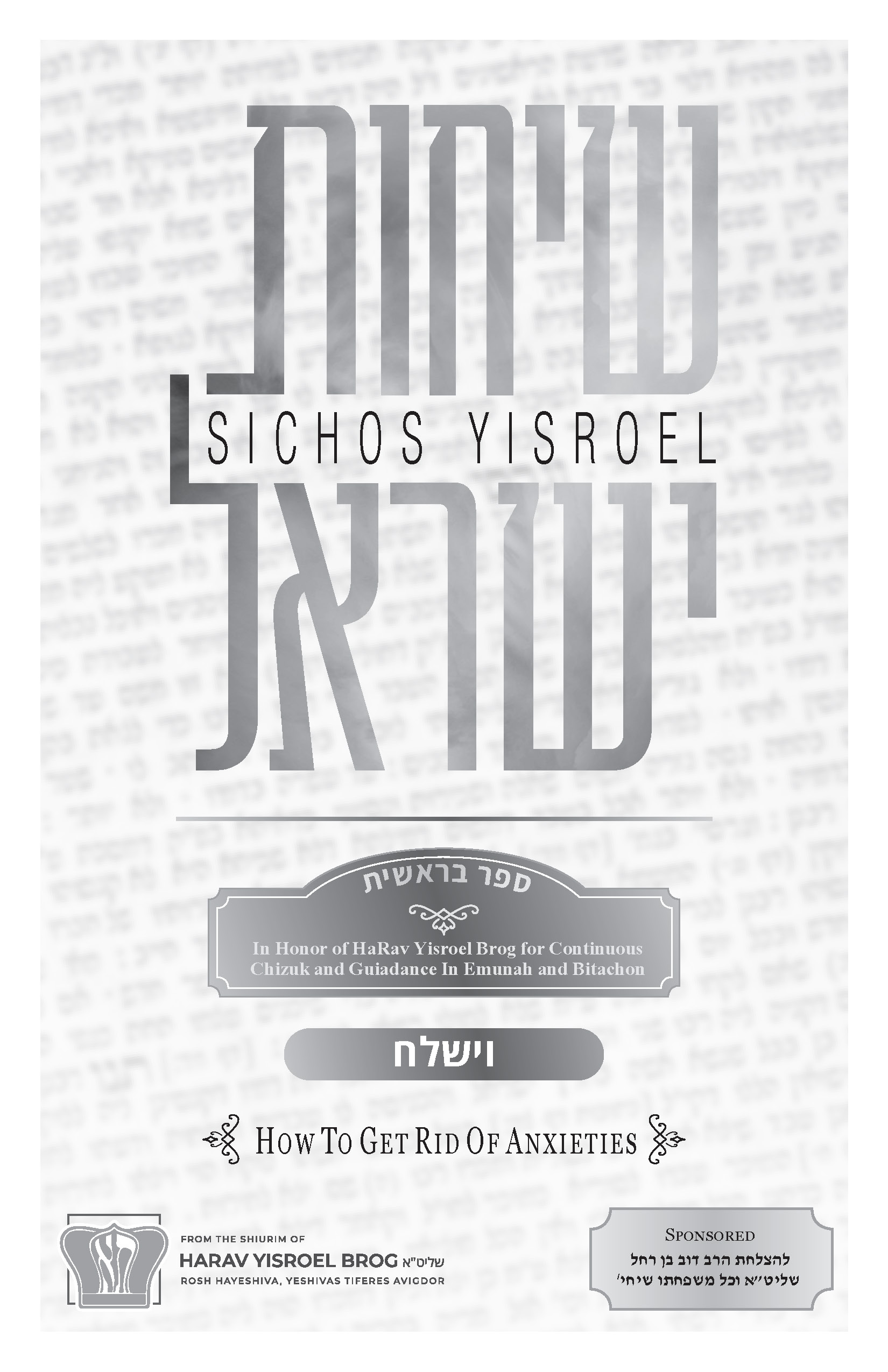Vayishlach 5783: How To Get Rid Of Anxieties
Sponsored
להצלחת הרב דוב בן רחל שליט”א וכל משפחתו שיחיה
Consider sponsoring a shiur
Visit YTATorah.org
Shiur presented in 5779
What Can We Learn From Yaakov Avinu’s Fear?
The parshah begins with the episode of Yaakov preparing himself for his ultimate meeting with Eisav, and the Torah tells us about Yaakov Avinu’s emotional state. It is rare for the Torah to reveal the emotional states of our avos and our imahos. But on rare occasions, Hashem pulls back the curtain. You have to realize that if the Torah does that, it means it’s important for us to know about it. We could face the same situation and we can learn from the Torah how to deal with.
The Torah tells us, וירא יעקב מאד, and Yaakov was very afraid (Bereishis 32:8). That’s a tremendous revelation; Yaakov Avinu, who was the bechir shebeavos, the choicest of the avos, was actually fearful! It doesn’t say stam he was fearful. Itsays וירא יעקב מאד – he was very fearful! You know what that means? That he was seriously scared. You know, if I say, “I was very scared,” it doesn’t mean I was very scared, that’s how people talk. You say, “He was scared out of his pants.” But truthfully, I never saw a guy actually getting scared out of his pants. But here it says in the Torah that Yaakov was very afraid – that’s some serious stuff!
Then the passuk says (ibid): ויצר לו, and he was in the state of tzarah, distress. Rashi tells us what he was afraid about. He was afraid that he would get killed and that his family would get killed. He was afraid that he would be put in situations where he would have to kill others.
Lechorah the passuk is a bit difficult to comprehend. When a person is afraid, what causes him to be afraid? Because he thinks about the impending tzarah. He’s facing a tzarah. Facing a tzarah makes a person be afraid. The passuk should have said the opposite. It should have said: ויצר לו, first that he was under a tzarah, he felt the impending tzarah, and then that tzarah caused him to be in the state of וירא יעקב מאד. Why does it say first he was afraid and then it says he was concerned about the tzarah?
My Rebbi (Rav Meir Halevi Soloveichik, zt”l) posed this question and spoke about this passuk quite a bit, from many different angles, and he quoted a Rema MiPano (Rav Menahem Azariah da Fano, 1548-1620) on the Asarah Ma’amaros,in the Ma’amar Choker Hadin.[i]He says an amazing chiddush there. When the Torah says וירא יעקב מאד, that he was very afraid, and then it says ויצר לו, the ויצר לו refers back to the words וירא יעקב מאד. The passuk is telling us, you know why he was in such a tzarah? Because וירא יעקב מאד, because Yaakov was so gripped by fear! That caused him to be in a state of tzarah. The fact that he was yarei miEisav, the fact that he was so afraid of dying and afraid that his family would get killed – that caused him to be in a state of tzarah. For Yaakov Avinu to be afraid?! How could Yaakov be afraid?! But that was the metzius, and the Torah doesn’t cover it up.
We would think that the Torah would never say anything negative about Yaakov Avinu. Would you say Rav Chaim Kanievsky was afraid? No, you would say Rav Chaim had bitachon. He had a lot of emunah and bitachon. You would pump it up. He’s fearless, etc. He’s Rav Chaim Kanievsky! But the Torah says Yaakov Avinu was very afraid, and that caused him to be in a tremendous state of tzarah.
If You Have Bitachon – You Have No Fear
A person who’s boteach in Hashem doesn’t have anything to be afraid of. The only thing you have to be afraid of is Hashem Himself. It says in the passuk in Mishlei (29:25),ובוטח בה’ ישגב, someone who relies on Hashem, ישגב, he’s going to be elevated, or raised above all tzarah. It says (Mishley 8:10), מגדל עוז, a strong fortress is the shem Hashem, בו, to it, ירוץ צדיק, a tzaddik flees there, ונשגב, and he gets elevated. My Rebbi quoted many pessukim. Dovid Hamelech said (Tehillim 27:3), אם תחנה עלי מחנה, if a camp of enemies comes around me, לא ירא ליבי, I’m not going to be afraid. Yet the Torah over here tells us וירא יעקב מאד and that caused him a tremendous pain and stress.
Now, if Yaakov Avinu was afraid of Eisav, he obviously understood who Eisav was. If you see a guy facing a tremendous, fearful situation, and he says, “I’m not afraid” you know that he does not fully understand the reality. I remember someone once called me to his house. He spoke his heart out to me And he tells me, “No one knows, but I’m on the verge of collapse. I’m on the verge of financial ruin. My family depends on me. My sons-in-law depend on me. My sons depend on me. My wife, I don’t know what she would do if she found out. I’m keeping it all in. I can’t eat. I can’t sleep. Could you give me some eitzah?” He said, “Don’t tell me about emunah and bitachon. That’s one thing that I’m very strong in.” I told him, “You mean to tell me that’s one thing you’re aware of and you’re very weak in, because if you had emunah and bitachon, you would sleep at night.”
I said, “You want to hear about a famous situation where somebody was in a very fearful situation? There was a ship that had professional sailors on it, and the ship was hit by a crazy storm. The ship was going to be torn to pieces.” In that story, there was a man who had bitachon and emunah. Do you know what he did? The sailors were going nuts. They were throwing boxes off the ship to lighten the load. But one man said, “I’m out of here. I’m going to take a nap.” When he went to take a nap, the sailors said, “What is with this man? He’s crazy. You’re taking a nap now?” So they follow him down to the hold. The captain of the ship goes down there, and he sees the man lying on his bunk. He says to him, “What is with you?” He says, “I’m taking a nap. What’s the big deal?” He said, “You know what’s going on around you?” “Eh, it doesn’t bother me. It’s Hashem.” “What do you mean it’s Hashem?” He said, “It’s my G-d that’s causing it. I’m not afraid of my G-d. I’m tight with Him. It’s all fine. Nothing to fear.”The captain said, “What do you mean?!” The man said, “Do you know that this whole storm is all about me? It’s not about you guys.”
He says, “Throw me into the sea.” You know what they say to him? “We don’t want to kill an innocent man.” He said, “Have no fear. Just dump me into the sea.” Can you imagine it? The goyim said we don’t want to throw you into the sea. How can we take a human being’s life like that? “I’m the cause of all this. Throw me into the sea.” Then they take him and throw him into the sea. You don’t see him screaming. You don’t see him kvetching. “Throw me into the sea.” Yonah Hanavi. They threw him into the sea, and the storm abated. Finished. That’s what you call a real serious bitachon.
If You Don’t Have Bitachon – You Have to Sweat
The Torah tells that when Yaakov Avinu was facing Eisav, he knew Eisav, believe it or not, better than any of us. He was his brother. He knew what kind of murderous human being his brother was. He knew what kind of fellow he was, what kind of conscience he had, and that he had no qualms to slit a guy’s throat and then to sit down to eat chili. Nothing bothered him.
This pshat, is not only from my Rebbi. I saw it from the Rema MiPano (ibid). And “the Malbim,” (Rav Leibush Wisser, 1809-1879), a famous commentator on the Torah writes the same thing. He explains that Yaakov felt terrible that he was lacking the middas habitachon, and he knew when he is in that matzav of feeling terrible and fearful, he’s not going to be raoy l’ness (fit for a miracle). The Malbim says the following: ‘הנה הבוטח בה, someone who is boteach in Hashem, אין לו לירא מבשר ודם, he should not have any fear of a basar v’dam. והירא, and one who is afraid, מורה, this indicates, שאין בטחונו כראוי, that his bitachon is not proper bitachon, as it says in the passuk (Yeshaya 51:12-13): מי את ותיראי מאנוש, Who are you? You’re afraid of human beings? ותשכח ה’ עושך, then you forget Hashem who made you.[ii]
He says, that’s the reason that Yaakov Avinu employed all kinds of natural efforts because he saw he wasn’t raoy l’ness. He prepared for war. He prepared gifts for bribery. He tried all kinds of hishtadlus.
Hashem Is the Only Ba’al Koach
Now, if a person wants to know if he has any degree of bitachon, he has to check whether he allows the challenge to have koach, or that אין עוד מלבדו – only Hashem has koach. Let’s say a guy is facing a big operation, or he is facing an enemy. One of the things that makes a person very afraid is when he’s called to court, either because he’s accused of something or because somebody made a court case against him. These are very common scenarios that people face in their lives. Somebody sues you and it could still be very costly.
I know a fellow who had an employee, and this employee turned out to be terrible. He had to let her go. The next thing he knows he is saddled with a lawsuit. When he checked into this person’s history, he discovered that this person has a history of going to work for people, getting fired and then suing them. She could destroy you totally. She gets lawyers, bulldogs who come after you. It was mamash unbelievable.
I remember the first time the person called me. He told me the whole story. I felt terrible for him. See, the more you know about a person and the more you know about the history, the stronger your fears are. If you didn’t know about the history, you would think you’re the first guy and you’d be less fearful. True, you’re not happy with the situation, but you’d get a lawyer to go after her.
I told this person, “You know what your biggest challenge is now? Your biggest challenge is that you’re giving this person such a koach over yourself. You’re giving this person such control because you’re believing in them. You’re thinking they have koach to destroy you and you believe in that destruction, and you become weak in the knees and your prophecy becomes fulfilled. The best thing to do in this situation, is to turn her into a ‘toothless tiger,’ and you have to say to yourself over and over, she has no koach. Her lawyers have no koach. There’s nothing that she can affect in your life. אין עוד מלבדו, only Hashem makes any decision. Only Hashem has any power. I didn’t do anything wrong, and I’m on Hashem’s side and Hashem’s on my side, not on her side.” I said, “Get there, to that place in your belief, and she will disappear.” And he got there. And she ‘disappeared.’
Eight months later, she came back again. I said, “Hashem is just showing you that He wants you to be boteach in Him, and not to fear people. I don’t care if she comes back ten times in your life. Hashem is always with you. You’re with Hashem. You’ve got to get there, over and over and over.” And if you don’t, then what happens is very sad, but you become your own destructionist.
A Practical Example of אין עוד מלבדו
I’ll never forget an occasion when I first employed this idea practically. I had my whole family in a van. I was driving in a 35-mile-an-hour zone in the country, out in yahupitsville, somewhere in Ohio. We were coming back from a trip. And suddenly I look. I see the cops. The lights are going behind me. I look at the speedometer. It says 55 miles an hour. Shrek. Who made my foot press the pedal so hard? I didn’t feel like I was going that fast. It was also a couple of years after the seatbelt law was instituted. It could mean an instant $100 fine. And baruch Hashem I had a lot of kids in the vehicle. I pulled over to the side of the road, and I closed my eyes. I thought there was hope because my stomach wasn’t gripped. I thought, “No. There’s really no reason to be afraid. The most they can saddle you with is a fine, a big fine, but it’s a fine. It’s only money.” Human nature is, when you see those lights behind you, you think they’re coming to put you away and you imagine the worst. You become overwhelmed with fear. You’re gripped. I remember Hashem was with me on that occasion. I felt no fear at all. I said אין עוד מלבדו. I closed my eyes. אין עוד מלבדו.
I heard somebody knocking on my window on the driver’s side. We had a normal conversation, but I was focussing on, “only Hashem has koach.” אין עוד מלבדו, אין עוד מלבדו אין עוד מלבדו. “Yes?” אין עוד מלבדו. “You were speeding.” “You’re right.” אין עוד מלבדו. And in my mind the guy wasn’t there by my door. I put my hand in my back pocket. I took out my license and registration. He said, “Is there anybody here in seatbelts?” אין עוד מלבדו. He said, “How many have you got here?” He starts counting, “1,2,3,4,5,6,7,8,9,10. How many people have you got in this thing?”
And the guy went back to his car for a while. I remember the whole time I was focussing on אין עוד מלבדו, אין עוד מלבדו, אין עוד מלבדו. Maybe fifteen minutes later, he came back and he gave me a description of all my crimes. He made me sound like the mafia chief. So bekitzur, he says, “This time I’m going to let you off with a warning.” “Thank you.” אין עוד מלבדו. I wasn’t looking at him. I was looking beyond him – at the yad Hashem.
The Only Thing that Helps – Bitachon
But then sometimes you are faced with a difficult situation and fear grips you. It’s too late then. The idea is, a person has to work on himself beforehand. A person has to exercise himself. You have to get into this mode of thinking about אין עוד מלבדו because this is the only thing that’s going to spare you. Fear is a natural part of people’s lives. It’s a metzius. I don’t know if there’s one person who doesn’t face serious situations. A person has to know that employing this tool of אין עוד מלבדו is the only thing that’s going to help. The Torah tells you this. Yaakov Avinu had a hard time.
We don’t meet up with people who pull guns on us too often or have murderous intent. Most fears that we face in our lives are not as severe. But a person has to know in advance what would help in such a situation.
Now, in Yaakov Avinu’s tefillah to Hashem, he said as follows: הצילני נא מיד אחי מיד עשו, he davened, “Please Hashem, save me from the hands of my brother, the hand of Eisav,” כי ירא אנכי אתו, I’m afraid of him, פן יבוא והכני אם על בנים, lest he come and kill me, mother with children (Bereishis 32:12). So the Hafla’ah, the Rebbi of the Chasam Sofer, Rav Pinchas Horowitz (1731-1805), in his commentary on the chumash (Panim Yafos) says, Yaakov Avinu said, “Hashem הצילני, please save me Hashem, כי ירא אנכי אתו, because I’m afraid of him. Because my bitachon is not up there where it should be.”[iii]
Dovid Hamelech says, ה’ לי לא אירא מה יעשה לי אדם, I’m not afraid of what any human being can do to me (Tehillim 118:6). Do you know why? Because he was boteach in Hashem, ה’ לי. Dovid Hamelech said, משמועה רעה לא יירא, from any bad shemuah, any bad news, he is never afraid. ‘נכון לבו בטח בה. He says סמוך לבו לא יירא, my heart is always at peace. My heart is never racing. I know I’m going to see the end of my enemies. You have to realize that the most powerful source of strength that you have is bitachon in Hashem.
Now, there are some people who try to ignore fear. They just ignore fear. And they think that that’s bitachon. That’s not bitachon. Bitachon is, as Dovid Hamelech said, יום אירא, the day I’m afraid, אני אליך אבטח. So the Brisker Rav asks: “If he’s boteach in Hashem why is it a יום אירא, why is it a day of fear?” And he says, because bitachon means that I’m fully cognizant, I’m fully aware of the predicament that I’m in. But I’m boteach in Hashem that I’m going to get out. Yes, and you could have bitachon in Hashem that you’re going to get out. Don’t let all those naysayers tell you, “Who says that’s what Hashem wants?” If Hashem sees you’re boteach in Him, Hashem wants you to get out of this matzav.
“Hashem, be mechazek me in emunah and bitachon.”
Now, you really have to prepare yourself for such situations. Every shemoneh esrei people want to know what to daven for besides parnasah. What you have to daven for is, “Hashem be mechazek me in emunah and bitachon. Please help me that when I face tzaros I should be able to employ my yiras Hashem, my bitachon in Hashem.” Don’t think that the yetzer hara is not going to work on you, and try to intrude on your thoughts, and try to make sure that you stay afraid and you remain afraid. He tries to be mevalbel your moach from all sides, and you have to say, af al pi ken I’m with Hashem. ה’ לי לא אירא מה יעשה לי אדם. You have to say this again and again and again. You have to say pessukim of bitachon. You have to say, “Hashem, help me.”
Now, I’ll tell you how to daven for this. When you daven to Hashem to help you go out of a state of charadah – anxietyand fears and other things – most people ask that from Hashem for their own personal insurance. Right? When I buy insurance for my car o r for my home or I buy life insurance, why do I buy it? It’s for myself. I don’t care about the insurance company. I don’t want to support the insurance company. It’s for my own personal benefit. Most people who ask Hashem for bitachom are asking Hashem to give it to them for their own personal self. And that’s the wrong thing. You have to ask Hashem, “I want to have bitachon because You want me to feel that I’m with You. I know You’re with me, but I want You to know that I want to feel that I’m with You, not just for insurance purposes but because that is Your ratzon, Hashem.” The ratzon of Hashem is עיני כל אליך ישברו ואתה נותן להם, Hashem wants us all to look to Him, to rely on Him, to be aware of Him. That’s what Hakadosh Baruch Hu wants.
There’s a famous gemara (Brachos 10a) that says: אפילו חרב חדה מונחת על צווארו של אדם אל ימנע עצמו מן הרחמים, even if a sharp sword is on the neck of a person, he should not withhold himself from rachamim. The gemara quotes a passuk in Iyov (13:15)הן יקטלני, they’re going to go kill me, לו איחל, I will hope to Hashem. Lechorah the gemara employs a very strange language. What is the meaning אל ימנע עצמו מן הרחמים? Don’t withhold from yourself rachamim. You know what that sounds like? That really when someone is a ‘rotzeh,’ somebody wants to give you rachamim, and you yourself are being monei’a this from yourself. So the gemara tells us, אל ימנע עצמו, don’t withhold from yourself rachamim. What kind of meshugene is going to withhold from himself rachamim? If someone wants to give him rachamim in his eis tzarah, would he withhold from himself rachamim?! It should have said אל ימנע עצמו מבקשת רחמים, don’t be monei’a yourself from asking for rachamim.
Hashem Wants You to Succeed
The teretz is, when a person is in a tzarah and sakanah, you have to know that’s a challenge and Hashem wants you to rise to the challenge. Hashem wants you to attach yourself to Him to rely on Him and be boteach in him and see this as a hand of Hashem and not believe in any other powers. Don’t give credibility or power to any force.Just turn to Hashem. And if you do that, you’re not going to be monei’a from yourself rachamim. But if you yourself say, “I’m afraid of this animal, I’m afraid of this person, I’m afraid of this situation,” so you are turning away from Hashem. You’re letting Hashem know that, “Hashem, with all due respect I’m just afraid right now. There is this big bear here.” When you turn away from Hakadosh Baruch Hu, you cause yourself to go away from the middah of bitachon and you lose your rachamim (i.e. rachamim that was yours, set aside for you, as the fruit of your bitachon). Chazal say, אפילו חרב חדה, even if you see a sharp sword on your neck, Hashem want you to know that even in that situation there are no swords. There’s just Hashem. אל ימנע עצמו מן הרחמים, don’t withhold from yourself rachamim. Don’t cause yourself to lose your bitachon in Hashem.
You have to know that whatever fear is prevalent, for whatever reason, sicknesses or other things, a person has the ability to wrap himself in a cocoon, in a protective layer of armor that could save his life and spirit. And that is bitachon. Very often, sicknesses grip people with tremendous fear and overwhelm them, and people have to know, that’s the time to say that Hashem is רופא חולי עמו ישראל. It says in the passuk ישלח דברו, Hashem will send forth His word, וירפאם, He will heal them, וימלט משחיתותם, He will save them from their destruction (Tehillim 107:20) Hakadosh Baruch Hu will save you from all those things that could be destructive.
Train Yourself When Things are Calm
It’s very difficult to do this without preparation, so you should prepare yourself because as you see, otherwise, most people lose themselves. Anytime you’re sitting around, this is something you should do as an exercise for yourself: Say, “Hashem, I’m boteach in You in one area.” Let’s say it’s refuah. “Hashem I’m boteach in You. The only reason why I’m healthy right now is because You’re רופא חולי עמי ישראל. The only reason my heart is working, the only reason that I’m able to stand and my hips and my knees and my shoulders and whatever it is that’s not bothering me, is because, Hashem, You are protecting me right now. There’s nothing to worry about.” You’ve got to get this concept into your kishkes.
A number of years ago there was a bachur who heard a shmooze from me, and he was arrested at the Canadian border a while later. He walked across the border without any ID, and when he wanted to go back into Canada, they arrested him. His car was parked half a mile from the border. That’s where he left his ID. When he came to the border, he said, “I just want to come back into the country.” They said, “Show me your ID.” He said, “I don’t have it. It’s in my car.” They put him in a holding pen. He got very nervous. He said, “I want to make a phone call. I’ve got this and that.” “ID, my friend.” They put him in a holding pen. He said he remembered the shmooze. He was there for a couple hours until it finally hit him and he closed his eyes and he said over and over, אין עוד מלבדו, אין עוד מלבדו. There’s nothing but Hashem. Only Hashem, by Hashem, from Hashem.” He was doing this intensely.
Suddenly, one of these unfriendly folks came over to him, tapped him on the shoulder and said, “Let’s go. I’m going to walk you to your car.” The bachur’s claim was that he had it in the car. “Come to my car, I’ll show you that I have it.” They left the police station. They walked a couple of steps. The guy says, “Are you sure you have it in your car?” Yes. The customs officer says, “Okay, you can go.” Pashut before that, they were screaming at him: “How do you walk into a country without identification?!” They were giving him all kinds of tzaros.
Turn it around. Turn everything around, Rabosai. Train yourself in this. If you do that, you’re going to be zocheh to all kinds of yeshuos in your lifetime.
[i] “ויירא יעקב מאד” היינו שהיה ירא את עשו, ועל יראה זו שהוכרח לירא את עשו “ויצר לו”. ומיד השתדל בהצלה על ידי חציית העם אשר אתו ועל ידי תפילה להקב”ה. כי יראת הפגעים היא רצועה בישא והיא תחת ולמטה מן אלהים קדושים מההוא אתר דאקרי יראת ה’ (עי’ זהר בראשית יא). (חיקור דין א כד, ס”ו)
[ii] ויירא יעקב מאד. הנה הבוטח בה’ אין לו לירא מב”ו, והיראה מורה שאין בטחונו כראוי, כמ”ש מי את ותראי מאנוש ימות ותשכח ה’ עושך, בפרט שיעקב היה לו הבטחה מה’ ולא היה לו לירא, וה’ אינו עושה נס למעלה מדרך הטבע רק למי שבוטח עליו בכל לבו, ואחר שראה יעקב שהוא מתירא, לכן ויצר לו, שזאת עצמו הצר לו שמזה דן שאינו ראוי לנסים אחר שבטחונו בלתי שלם, וע”כ נסה לעשות הכנות טבעיות ותכסיסי מלחמה, ויחץ את העם עם הצאן והבקר לשני מחנות, היינו שמן העם שאתו דהיינו הנשים והטף עשה מחנה אחת, ומן המקנה והרועים עשה מחנה שניה. ויאמר אם יבוא עשו אל המחנה האחת, שהיינו המקנה והרועים, והכהו, יהיה בתוך כך הנפשות לפליטה, כי אז יודע שבא למלחמה וינוסו או ילחמו אתו.
[iii] כי ירא אנכי אותו פן יבוא והכני (בראשית לב, יב). ענינו יש לפרש על פי מה שכתבנו בפ’ (תהילים קיח, ה) ה’ לי לא אירא מה יעשה לי אדם, כי בשכר הבטחון הוא ההצלה, כאמור (ירמיה יז, ז) ברוך הגבר אשר יבטח בה’ והיה ה’ מבטחו, כי בזה שהוא בוטח בה’ הוא הגורם להתקיים הבטחתו, והיראה והפחד הוא מניעת ההצלה. וז”ש ה’ יהיה לי שלא אירא, ואז ממילא מה יעשה לי אדם. וזהו מה שאומרים בתחנונים נבהלה נפשנו מרוב עצבונינו, מחמת העצבון וחוסר הבטחון מזה עצמו נבהלה נפשינו. וזה שאמר יעקב כי ירא אנכי אותו, ר”ל מחמת שאני ירא אותו, והוא החשש הגורם פן יבא והכני. והיינו דקאמר כי במקלי וגו’, כי זהו ענין שאמר הקב”ה למשה (שמות יד, טו) מה תצעק אלי דבר אל ב”י ויסעו, כי מה שהיו בטוחים שיבקע הים בפניהם כדכתיב (תהילים סח, כח) שם בנימין צעיר רודם, הוא עצמו הגורם שיבקע הים מפניהם כמו שיבואר במקומו, וכן יעקב כשעבר את הירדן מתוך גודל בטחונו נבקע מפניו, וכיון שעתה אין בטחונו כ”כ כי ירא אנכי אותו ע”כ צריך אני לתפילה הצילני וגו’.






